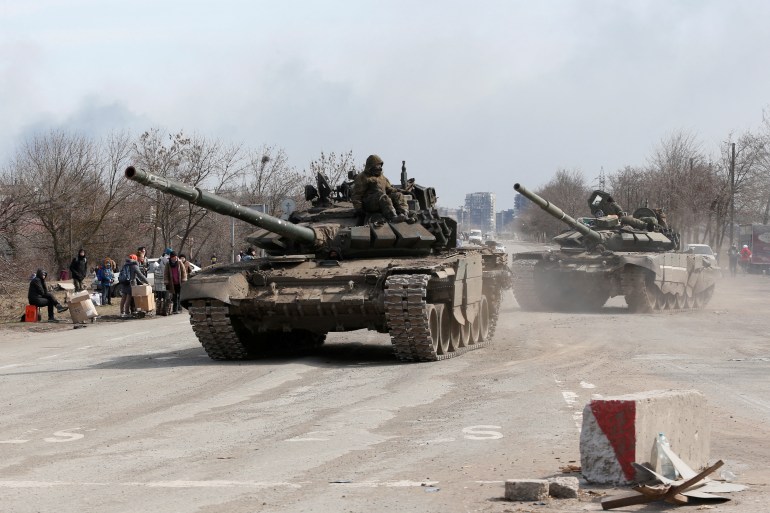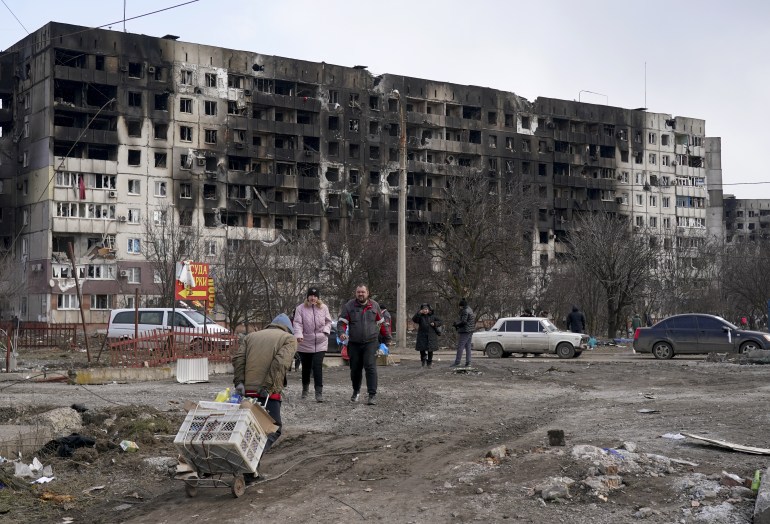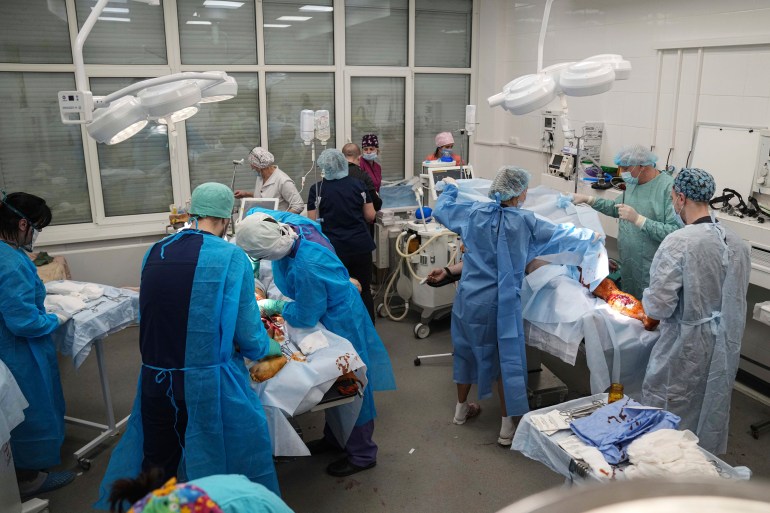Names on a list: Fleeing Mariupol, one checkpoint at a time
Journalists recount their escape from southeast Ukraine port metropolis, which Russian forces have entered after weeks of encirclement and bombardment.

Mstyslav Chernov is a video journalist for The Related Press information company. That is his account of the siege of Mariupol, as documented with photographer Evgeniy Maloletka and advised to correspondent Lori Hinnant.
The Russians had been looking us down. They'd a listing of names, together with ours, they usually had been closing in.
We had been the one worldwide journalists left within the Ukrainian metropolis, and we had been documenting its siege by Russian troops for greater than two weeks. We had been reporting contained in the hospital when gunmen started stalking the corridors. Surgeons gave us white scrubs to put on as camouflage.
Instantly at daybreak, a dozen troopers burst in, “The place are the journalists, for f***’s sake?”
I checked out their armbands, blue for Ukraine, and tried to calculate the percentages that they had been Russians in disguise. I stepped ahead to establish myself. “We’re right here to get you out,” they stated.
The partitions of the surgical procedure shook from artillery and machine-gun hearth exterior, and it appeared safer to remain inside. However the Ukrainian troopers had been below orders to take us with them.
We bumped into the road, abandoning the medical doctors who had sheltered us, the pregnant girls who had been shelled and the individuals who slept within the hallways as a result of they'd nowhere else to go. I felt horrible leaving all of them behind.
9 minutes, possibly 10, an eternity by roads and bombed-out residence buildings. As shells crashed close by, we dropped to the bottom. Time was measured from one shell to the subsequent, our our bodies tense and breath held. Shockwave after shockwave jolted my chest, and my fingers went chilly.
We reached an entryway, and armoured vehicles whisked us to a darkened basement. Solely then did we be taught from a policeman why the Ukrainians had risked the lives of troopers to extract us from the hospital.
“In the event that they catch you, they are going to get you on digicam and they'll make you say that all the things you filmed is a lie,” he stated. “All of your efforts and all the things you've gotten performed in Mariupol shall be in useless.”
The officer, who had as soon as begged us to indicate the world his dying metropolis, now pleaded with us to go. He nudged us towards the 1000's of battered vehicles making ready to depart Mariupol.
It was March 15. We had no concept if we might make it out alive.

As a youngster rising up in Ukraine within the metropolis of Kharkiv, simply 32 kilometres (20 miles) from the Russian border, I discovered find out how to deal with a gun as a part of the varsity curriculum. It appeared pointless. Ukraine, I reasoned, was surrounded by pals.
I've since lined wars in Iraq, Afghanistan and the disputed territory of Nagorno-Karabakh, attempting to indicate the world the devastation firsthand. However when the People after which the Europeans evacuated their embassy workers from town of Kyiv this winter, and once I pored over maps of the Russian troop build-up simply throughout from my hometown, my solely thought was, “My poor nation.”
Within the first few days of the struggle, the Russians bombed the big Freedom Sq. in Kharkiv, the place I had frolicked till my 20s.
I knew Russian forces would see the jap port metropolis of Mariupol as a strategic prize due to its location on the Sea of Azov. So on the night of February 23, I headed there with my longtime colleague Evgeniy Maloletka, a Ukrainian photographer for The Related Press, in his white Volkswagen van.
On the way in which, we began worrying about spare tyres, and located on-line a person close by prepared to promote to us in the course of the night time. We defined to him and to a cashier on the all-night grocery retailer that we had been making ready for struggle. They checked out us like we had been loopy.
We pulled into Mariupol at 3:30am. The struggle began an hour later.
A few quarter of Mariupol’s 430,000 residents left in these first days, whereas they nonetheless might. However few individuals believed a struggle was coming, and by the point most realised their mistake, it was too late.
One bomb at a time, the Russians lower electrical energy, water, meals provides and eventually, crucially, the [mobile phone], radio and tv towers. The few different journalists within the metropolis received out earlier than the final connections had been gone and a full blockade settled in.
The absence of data in a blockade accomplishes two targets.
Chaos is the primary. Folks don’t know what’s occurring, they usually panic. At first, I couldn’t perceive why Mariupol fell aside so shortly. Now, I do know it was due to the shortage of communication.
Impunity is the second purpose. With no info popping out of a metropolis, no footage of demolished buildings and dying kids, the Russian forces might do no matter they wished. If not for us, there could be nothing.
That’s why we took such dangers to have the ability to ship the world what we noticed, and that’s what made Russia offended sufficient to hunt us down.
I've by no means, ever felt that breaking the silence was so necessary.

The deaths got here quick. On February 27, we watched as a health care provider tried to avoid wasting a little bit woman hit by shrapnel. She died.
A second baby died, then a 3rd. Ambulances stopped selecting up the wounded as a result of individuals couldn’t name them with out a sign, they usually couldn’t navigate the bombed-out streets.
The medical doctors pleaded with us to movie households bringing in their very own useless and wounded, and allow us to use their dwindling generator energy for our cameras. Nobody is aware of what’s occurring in our metropolis, they stated.
Shelling hit the hospital and the homes round. It shattered the home windows of our van, blew a gap into its aspect and punctured a tyre. Typically, we might run out to movie a burning home after which run again amid the explosions.
There was nonetheless one place within the metropolis to get a gradual connection, exterior a looted grocery retailer on Budivel’nykiv Avenue. As soon as a day, we drove there and crouched beneath the steps to add pictures and video to the world. The steps wouldn’t have performed a lot to guard us, however it felt safer than being out within the open.
The sign vanished by March 3. We tried to ship our video from the seventh-floor home windows of the hospital. It was from there that we noticed the final shreds of the strong middle-class metropolis of Mariupol come aside.
The Port Metropolis superstore was being looted, and we headed that approach by artillery and machine-gun hearth. Dozens of individuals ran and pushed purchasing carts loaded with electronics, meals, garments.
A shell exploded on the roof of the shop, throwing me to the bottom exterior. I tensed, awaiting a second hit, and cursed myself 100 instances as a result of my digicam wasn’t on to document it.
And there it was, one other shell hitting the residence constructing subsequent to me with a horrible whoosh. I shrank behind a nook for canopy.
A young person handed by rolling an workplace chair loaded with electronics, bins tumbling off the edges. “My pals had been there and the shell hit 10 metres from us,” he advised me. “I don't know what occurred to them.”
We raced again to the hospital. Inside 20 minutes, the injured got here in, a few of them scooped into purchasing carts.
For a number of days, the one hyperlink we needed to the skin world was by a satellite tv for pc cellphone. And the one spot the place that cellphone labored was out within the open, proper subsequent to a shell crater. I'd sit down, make myself small and attempt to catch the connection.
All people was asking, please inform us when the struggle shall be over. I had no reply.
Each single day, there could be a hearsay that the Ukrainian military was going to return to interrupt by the siege. However nobody got here.

By this time, I had witnessed deaths on the hospital, corpses within the streets, dozens of our bodies shoved right into a mass grave. I had seen a lot demise that I used to be filming nearly with out taking it in.
On March 9, twin [air raids] shredded the plastic taped over our van’s home windows. I noticed the fireball only a heartbeat earlier than ache pierced my interior ear, my pores and skin, my face.
We watched smoke rise from a maternity hospital. Once we arrived, emergency staff had been nonetheless pulling bloodied pregnant girls from the ruins.
Our batteries had been nearly out of juice, and we had no connection to ship the pictures. Curfew was minutes away. A police officer overheard us speaking about find out how to get information of the hospital bombing out.
“It will change the course of the struggle,” he stated. He took us to an influence supply and an web connection.
We had recorded so many useless individuals and useless kids, an limitless line. I didn’t perceive why he thought nonetheless extra deaths might change something.
I used to be improper.
In the dead of night, we despatched the pictures by lining up three cell phones with the video file break up into three elements to hurry the method up. It took hours, nicely past curfew. The shelling continued, however the officers assigned to escort us by town waited patiently.
Then our hyperlink to the world exterior Mariupol was once more severed.
We went again to an empty lodge basement with an aquarium now stuffed with useless goldfish. In our isolation, we knew nothing a couple of rising Russian disinformation marketing campaign to discredit our work.
The Russian Embassy in London put out two tweets calling the AP pictures faux and claiming a pregnant lady was an actress. The Russian ambassador held up copies of the pictures at a UN Safety Council assembly and repeated lies in regards to the assault on the maternity hospital.
Within the meantime, in Mariupol, we had been inundated with individuals asking us for the newest information from the struggle.
So many individuals got here to me and stated, “Please movie me so my household exterior town will know I’m alive.”
By this time, no Ukrainian radio or TV sign was working in Mariupol. The one radio you might catch broadcast twisted Russian lies — that Ukrainians had been holding Mariupol hostage, taking pictures at buildings, growing chemical weapons. The propaganda was so sturdy that some individuals we talked to believed it regardless of the proof of their very own eyes.
The message was consistently repeated, in Soviet fashion: Mariupol is surrounded. Give up your weapons.
On March 11, in a quick name with out particulars, our editor requested if we might discover the ladies who survived the maternity hospital [attack] to show their existence. I realised the footage will need to have been highly effective sufficient to impress a response from the Russian authorities.
We discovered them at a hospital on the entrance line, some with infants and others in labour. We additionally discovered that one lady had misplaced her child after which her personal life.
We went as much as the seventh ground to ship the video from the tenuous web hyperlink. From there, I watched as tank after tank rolled up alongside the hospital compound, every marked with the letter “Z” that had develop into the Russian emblem for the struggle.
We had been surrounded: Dozens of medical doctors, tons of of sufferers, and us.

The Ukrainian troopers who had been defending the hospital had vanished. And the trail to our van, with our meals, water and tools, was lined by a Russian sniper who had already struck a medic venturing exterior.
Hours handed in darkness, as we listened to the explosions exterior. That’s when the troopers got here to get us, shouting in Ukrainian.
It didn’t really feel like a rescue. It felt like we had been simply being moved from one hazard to a different. By this time, nowhere in Mariupol was protected, and there was no aid. You can die at any second.
I felt amazingly grateful to the troopers, but additionally numb. And ashamed that I used to be leaving.
We crammed right into a Hyundai with a household of three and pulled right into a five-kilometre-long (3.1-mile-long) visitors jam out of town. Roughly 30,000 individuals made it out of Mariupol that day — so many who Russian troopers had no time to look carefully into vehicles with home windows lined with flapping bits of plastic.
Folks had been nervous. They had been combating, screaming at one another. Each minute there was an aeroplane or [air raid]. The bottom shook.
We crossed 15 Russian checkpoints. At every, the mom sitting within the entrance of our automotive would pray furiously, loud sufficient for us to listen to.
As we drove by them — the third, the tenth, the fifteenth, all manned with troopers with heavy weapons — my hopes that Mariupol was going to outlive had been fading. I understood that simply to succeed in town, the Ukrainian military must break by a lot floor. And it wasn’t going to occur.
At sundown, we got here to a bridge destroyed by the Ukrainians to cease the Russian advance. A Purple Cross convoy of about 20 vehicles was caught there already. All of us turned off the street collectively into fields and again lanes.
The guards at checkpoint 15 spoke Russian within the tough accent of the Caucasus. They ordered the entire convoy to chop the headlights to hide the arms and tools parked on the roadside. I might barely make out the white Z painted on the autos.
As we pulled as much as the sixteenth checkpoint, we heard voices. Ukrainian voices. I felt an amazing aid. The mom within the entrance of the automotive burst into tears. We had been out.
We had been the final journalists in Mariupol. Now, there are none.
We're nonetheless flooded by messages from individuals desirous to be taught the destiny of family members we photographed and filmed. They write to us desperately and intimately, as if we aren't strangers, as if we can assist them.
When a Russian [air attack] hit a theatre the place tons of of individuals had taken shelter late final week, I might pinpoint precisely the place we should always go to find out about survivors, to listen to firsthand what it was prefer to be trapped for limitless hours beneath piles of rubble. I do know that constructing and the destroyed houses round it.
I do know people who find themselves trapped beneath it.
And on Sunday, Ukrainian authorities stated Russia had bombed an artwork faculty with about 400 individuals in it in Mariupol.
However we will now not get there.
Đăng nhận xét for "Names on a list: Fleeing Mariupol, one checkpoint at a time"